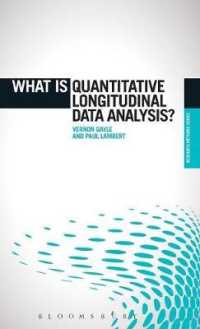Full Description
This book addresses health professions educational challenges specific to non-Western cultures, implementing a shifting paradigm for educating future health professionals towards patient-centered care. While health professions education has received increasing attention in the last three decades, promoting student-centered learning principles pioneered by leaders in the medical community has, for the most part, remain rooted in the Western context. Building from Hofstede's analysis of the phenomena of cultural dimensions, which underpin the way people build and maintain their relationships with others and influence social, economic, and political well-being across nations, this book demarcates the different cultural dimensions between East and West, applied to medical education. The respective 'hierarchical' and 'collectivist' cultural dimensions are unpacked in several studies stemming from non-western countries, with the capacity to positively influence healthcare educationand services. The book provides new insights for researchers and health professional educators to understand how cultural context influences the input, processes, and output of health professionals' education. Examples include how cultural context influences the ways in which students respond to teachers, how teachers giving feedback to students, and the challenges of peer feedback and group work. The authors also examine causes for student hesitation in proposing ideas, the pervasive cultural norm of maintaining harmony, the challenges of teamwork in clinical settings, the need to be sensitive to community health needs, the complexity of clinical decision making, and the challenge of how collectivist cultural values play into group dynamics. This book aims to advocate a more culturally-sensitive approach to educating health professionals, and will be relevant to both students and practitioners in numerous areas of public health and medical education.
Contents
Chapter 1. Student-centered Learning.- Chapter 2. Facilitating Learning.- Chapter 3. Learning Resources.- Chapter 4. Workplace-based Learning.- Chapter 5. Curriculum Development.- Chapter 6. Student-Assessment.- Chapter 7. Professionalism Education.- Chapter 8. Quality Assurance.- Chapter 9. Leadership.- Chapter 10. Personal and Professional Development.- Chapter 11. Interprofessional Education.- Chapter 12. Student and Faculty Well-being.- Chapter 13. Way Forward.








